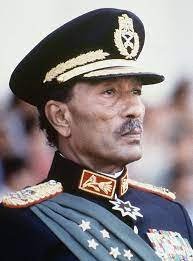The Yom Kippur War started on October 6, 1973 between Egypt and Syria. It is also known as the October War, the Ramadan War, the October 1973 Arab-Israeli War, and the Fourth Arab-Israeli War. The name “Yom Kippur” derives the day, that was a holy Jewish day, Yom Kippur. “Ramadan War” as it was the holy month of Ramadan for Muslims as well.
The striking coincidence cannot be missed with the ongoing Israel-Hamas war. The Yom Kippur War was a brief but intense war. The 1973 war was carried by Egypt and Syrian fighters retaliating the Six-Day War of 1967, where they lost their territory to Israel.
The October 7 attack by Hamas seemed to signify the similar timing by attacking Israel, exactly 50 years past.
The Yom Kippur War
The conflict started with the diplomatic goal of convincing Israel to negotiate on terms more favorable to the Arab countries. Ultimately, the war brought the US and the USSR (Soviet Union) into an indirect confrontation in support of their respective allies.
Anwar Sadat, President of Egypt, offered to mediate a peaceful resolution provided that Israel returned the territory it had taken during the Six Day War,1969, in negotiations with United Nations Resolution 242. Israel rejected the agreements, turning the conflict into a full-scale war in 1973.

Israel with the help of giant US artillery, tanks, jet fighters, and ammunition drove back the attackers reclaiming the territory.
In support of its Arab allies, the Soviet Union directly interfered and issued a threat of total war. The American nuclear forces were briefly put on high alert (DEFCON 3). The issue eventually subsided when the United States and the Soviet Union decided to support a UN peacekeeping force.
After fifty years, the memory of that conflict remains vivid and deeply ingrained in the Israeli people’s minds. Even though the majority of Americans living now were not even born in 1973, the consequences of that year have continued to influence everyone who has come after.
The effects of the Yom Kippur War have had a significant influence on U.S. foreign and energy policy orientation ever since, as well as the 1970s.
After the Yom Kippur attacks in 1973, Israeli Prime Minister Golda Meir turned to the United States for aid. The United States decided to show its support for Israel with such vigor that Saudi Arabia and other Arab nations decided to stop shipping crude oil to the United States. The United States had grown largely dependent on foreign producers with cheaper production costs, despite producing significant amounts of oil domestically.

The world market saw a 300% increase in the price of a barrel of crude oil, while gas prices at the pump quadrupled. Following decades of cheap oil and gas, Americans were unprepared for the first “oil shock.”
The disruption brought by this situation would leave all three of the presidents during the 1970s severely damaged. It could also play a role in Ronald Reagan’s election in 1980.
Iran’s involvement, then and now
The US authorities intended to avert a wider regional conflict that might encompass neighboring Arab nations as well as the Islamic Republic of Iran, which has been Israel’s most resolute enemy in recent years.
Iran has also become a significant source of Russian drones and other high-tech weapons that are being used in Ukraine. As a result, Russia and its nuclear weapons may once more play a role in the region’s high-stakes politics, specifically in the Israeli-Palestinian conflict.
Iran’s involvement in the Hamas attack could be interpreted as a lead-up to a more significant role. A large portion of the weapons that Hamas fighters used, are thought to have received from Iran.

Iran’s longstanding support for Hezbollah, another political-military group that operates in and out of Lebanon, Israel’s northern neighbor explaining its further involvement.
It could also involve a more visible support for Hamas and opposition to Israel’s attack into Gaza.
Thus, Israel emerged victorious from the 1973 war, but at a heavy cost to the US. The United States and the Soviet Union were now closer than ever before, to a nuclear exchange, even though the conflict did not end forever.
The Yom Kippur resembles the present day war
Not only does the time and day match, but the allies supporting both the regions remain same. US president Joe Biden visited Israel PM Benjamin Netanyahu days after the October 7 attack. UK PM Rishi Sunak also showed his gesture.
Many Arab nations, including Iran, Egypt, Turkey, Lebanon, Qatar, have condemned the genocide in Gaza and promised retaliation.
More than 8000 people have been killed in Gaza by Israel and 1400 in Israel by the Hamas attack.












Comments 1